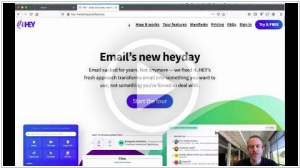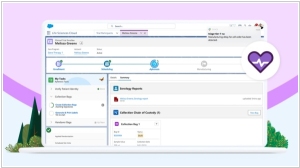Basecamp vs Smartsheet
August 10, 2023 | Author: Adam Levine
12
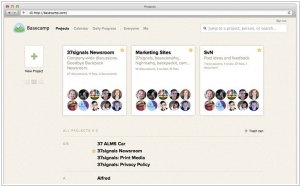
Basecamp tackles project management with a focus on communication and collaboration. Making to-do lists and adding to-do items literally just takes seconds. Basecamp is optimized to make the things you do most often really fast and really easy. Basecamp mobile is especially made for popular mobile devices like iPhone and Android.
28
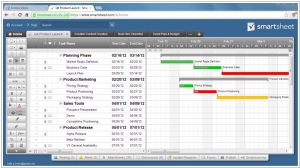
Smartsheet is an online project management and crowdsourcing tool. It allows owners of information to comprehensively involve contributors through authenticated access, publicly-accessible published sheets, or via embeddable survey forms. Functionality is focused on the ability to organize, share, and update tasks and files.
Basecamp and Smartsheet are both popular project management tools, but they have distinct differences in their features and focus. Basecamp is known for its simplicity and user-friendly interface, offering features such as task management, document sharing, messaging, and scheduling. It emphasizes collaboration, communication, and centralizing project information in one place. On the other hand, Smartsheet is a powerful project management and collaboration platform that provides features such as task tracking, Gantt charts, resource management, and customizable workflows. Smartsheet is more robust and suitable for complex project management needs, offering advanced project planning and resource allocation capabilities.
See also: Top 10 Project Management software
See also: Top 10 Project Management software
Basecamp vs Smartsheet in our news:
2020. Basecamp launches Hey, a hosted email service for neat freaks
Project management software maker Basecamp has introduced an innovative hosted email service named Hey. With Hey, the company aims to tackle the chaos and clutter typically associated with traditional email inboxes. One of its notable features is a built-in screener that prompts users to confirm whether they wish to receive emails from new senders. Upon consent, inbound emails are sorted into different trays. The central "imbox" (short for important box) exclusively contains communications designated as important by the user. Newsletters are organized in a News Feed-style tray called The Feed, where they are conveniently displayed in a partially opened format for casual reading. Additionally, email receipts are neatly arranged in a dedicated inbox view called the Paper Trail, serving as a reference for users.
2019. Smartsheet acquires Slope to help creatives collaborate
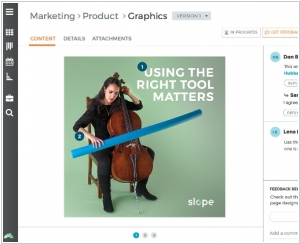
Smartsheet, the renowned project management and collaboration tool, has recently completed the acquisition of Slope, a collaboration tool specifically designed for sharing creative assets. This integration of Slope into the Smartsheet platform empowers users to seamlessly share assets such as videos and photos directly within the application. Moreover, it introduces the functionality to annotate, comment on, or approve these assets. Smartsheet envisions this native integration from a broad enterprise perspective. It facilitates various scenarios, including HR teams sharing training videos, marketing departments exchanging product photos, or construction company employees inspecting a site and collaboratively addressing code violations by sharing annotated photos to highlight the issues at hand.
2018. Basecamp adds recurring events and image galleries
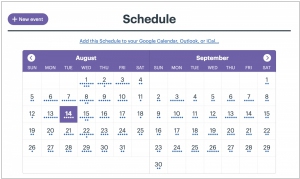
Project management service Basecamp has introduced several exciting new features. The first addition is Recurring events, allowing users to schedule daily, weekly, monthly, and yearly repeating events within Basecamp 3. Users can choose to set the recurrence until a specific date or continue indefinitely. The second feature is Image galleries, which enables users to showcase their work or share photos in visually appealing side-by-side or three-in-a-row layouts. This enhancement makes it easier than ever to present visual content. Lastly, Basecamp introduces Automatic Check-ins, a simple and informal tool extensively utilized for team communication. The entire company can engage in queries such as sharing weekend activities and work updates, while smaller teams like Support can address specific questions related to common issues encountered during the week. These new features enrich the Basecamp experience, enhancing collaboration and streamlining communication within teams.
2018. Basecamp improves client collaboration
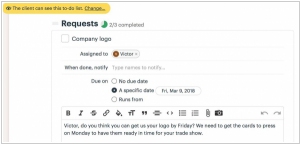
Collaborating with clients in Basecamp has been significantly enhanced, offering an improved experience. The latest updates enable you to effortlessly assign to-dos to clients, share files and folders, schedule events and meetings, engage in Campfire chats, and even automatically ask clients check-in questions. Within a project, all items are now clearly labeled as either "private to our team" or "visible to the client." To avoid any unexpected sharing mishaps and minimize concerns, every item within a project begins as private, accessible only to your team. When you post something new, you have the flexibility to specify whether it should be visible to the client or remain private within your team. These enhancements ensure smoother collaboration and allow for precise control over shared information in Basecamp.
2018. Smartsheet got $1.9 billion valuation after IPO
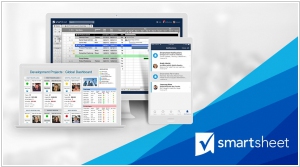
Upon its debut in the public markets, online project management and crowdsourcing company Smartsheet witnessed a surge in its share prices. Smartsheet concluded at $19.50, representing a 30 percent increase from its initial price of $15, resulting in a market capitalization of $1.9 billion. Although the company recorded net losses in its financial statements, it exhibited robust revenue growth. In its IPO filings, Smartsheet disclosed a substantial user base of 3.6 million, including notable business clients such as Cisco and Starbucks. For the fiscal year 2018, the company generated $111.3 million in revenue. However, similar to many Software-as-a-Service (SaaS) companies, Smartsheet is going public while reporting a loss.
2017. Collaboration service Smartsheet gets $52M
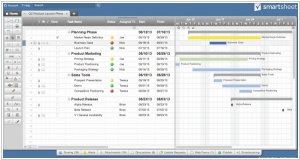
The spreadsheet software service, Smartsheet, has recently secured $52 million in funding. With approximately 70,000 businesses currently subscribed to its product, ranging from small and medium-sized businesses to large enterprises, Smartsheet has amassed around 550,000 licensed customers. Additionally, there are "a few million" individuals who utilize the service free of charge. Since its establishment in 2006, Smartsheet has positioned itself as an early entrant in the market, offering an alternative to Google Docs, Excel, and other spreadsheet applications. Its distinctive focus lies in facilitating collaboration among multiple users within these documents, allowing for dynamic utilization and efficient teamwork.
2014. Smartsheet helps companies to visualize their teamwork
The spreadsheet-based project and work management platform, Smartsheet, has introduced new features to enhance companies' understanding of their employees' work processes and provide improved visibility into their operations. The primary objective is to effectively track various projects and the individuals involved within the organization. With the introduction of Smartsheet Account Maps, users can easily identify the key contributors and project leaders within a group, which can be advantageous when requesting a raise. Conversely, it also highlights those who may have limited involvement, which may be less favorable during annual performance evaluations. Additionally, Smartsheet Account Maps enable users to visualize the connections between different groups within the organization. By default, a basic map is made available to all users, facilitating a better understanding of project dynamics and team interactions.
2014. Basecamp app is available for iPad
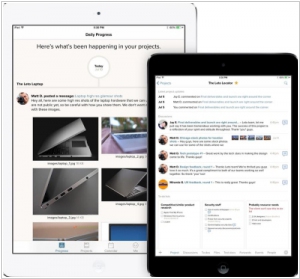
The official app for iPad has been launched by the popular project management service Basecamp, expanding beyond its previous availability only on iPhone and the web for iPad users. This app enables users to conveniently access their projects from anywhere, providing updates on each project's latest news, facilitating participation in discussions and sharing thoughts, and allowing the viewing of team members' progress as they complete tasks and upload files. With all project-related information accessible, users can easily reference documents and make decisions regardless of their location. The app boasts a swift and responsive performance, featuring a clean and well-organized interface.
2014. 37Signals renames to Basecamp, discontinues development of other products
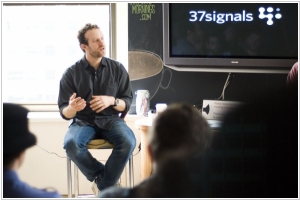
37Signals emerged as one of the pioneers in the SaaS market. In 2004, they introduced Basecamp, a project management service that remains highly popular to this day. It boasts a user base of 15 million individuals and is often regarded as a trailblazer in web-app design. Notably, 37Signals CEO, Jason Fried, is widely recognized, and he has authored books such as Getting Real and ReWork. Jason's profound admiration for small businesses and the startup ethos is evident. Despite Basecamp's remarkable success, he has successfully maintained the startup mentality within the company, employing only 43 individuals. Jason even experimented with scaling back the customer base to control growth. Presently, he has conceived a new idea: to pause the development of other products (including the CRM system Highrise, group chat Campfire, task-manager Ta-Da List, wiki Writeboard, and organizer Backpack) and concentrate all efforts on Basecamp. Moreover, he has decided to rename the company from 37Signals to Basecamp, a concise and elegant title. If you are a user of 37Signals products affected by this decision, there is no need to panic. The products will continue to function and receive support in the future, albeit without further feature updates.
2013. Basecamp launches mobile app for iOS
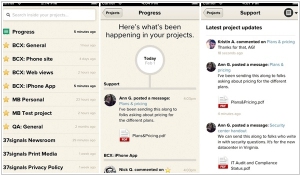
HTML5 has taken a backseat to mobile applications, at least for the time being. Jason Fried, the CEO of the highly popular project management service Basecamp, has always prioritized the effectiveness of his product over following trends or engaging in mere PR stunts. He previously held the belief that focusing on the web interface was the best approach rather than chasing the multitude of mobile platforms. As a result, Basecamp was only available as a web app for mobile devices. However, Jason has recently concluded that a native client would offer greater convenience. As a result, Basecamp is now accessible as a native app for iPhone and iPad. The app is free and showcases the new, visually appealing style of the web version.

